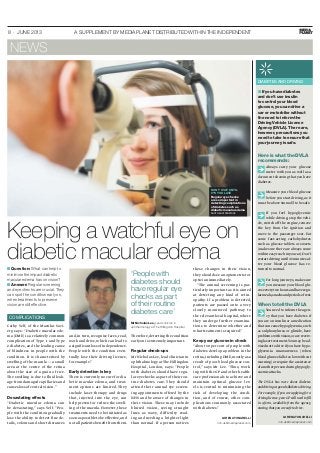
Keeping a watchful eye on diabetic macular edema
- 1. 8 · JUNE 2013 A SUPPLEMENT BY MEDIAPLANET DISTRIBUTED WITHIN THE INDEPENDENT Keeping a watchful eye on diabetic macular edema Cathy Yelf, of the Macular Soci- ety, says: “Diabetic macular ede- ma (DME) is a relatively common complication of Type 1 and Type 2 diabetes, and the leading cause of blindness in people with the condition. It is characterised by swelling of the macula — a small area at the centre of the retina about the size of a grain of rice. The swelling is due to fluid leak- age from damaged capillaries and causes loss of central vision.” Devastating effects “Diabetic macular edema can be devastating,” says Yelf. “Peo- ple with the condition gradually lose the ability to detect fine de- tails, colours and short distances and,in turn,recognise faces,read, work and drive,which can lead to a significant loss of independence. People with the condition even- tually lose their driving licence, for example.” Early detection is key There is currently no cure for dia- betic macular edema, and treat- ment options are limited. They include laser therapy and drugs that, injected into the eye, can help prevent or reduce the swell- ing of the macula. However, these treatments need to be initiated as soon as possible to be effective,and not all patients benefit from them. Therefore,detecting the condition early on is extremely important. Regular check-ups Mr Nicholas Lee,lead clinician in ophthalmology at The Hillingdon Hospital, London, says: “People with diabetes should have regu- lar eye checks as part of their rou- tine diabetes care. They should attend their annual eye screen- ing appointments offered by the NHS and be aware of changes in their vision. These may include blurred vision, seeing straight lines as wavy, difficulty read- ing and needing a brighter light than normal. If a person notices these changes in their vision, they should see an optometrist or optician immediately. “The annual screening is par- ticularly important as it is aimed at detecting any kind of retin- opathy. If a problem is detected, patients are passed onto a very closely monitored pathway to the relevant local hospital,where they undergo further examina- tions to determine whether and what treatment is required.” Keep your glucose in check “About 30 per cent of people with diabetes develop a problem in the retina,including DME,mostly as a result of poor blood glucose con- trol,” says Mr Lee. “Thus, work- ing with the GP and other health- care professionals to achieve and maintain optimal glucose lev- els is central to minimising the risk of developing the condi- tion, and of course, other com- plications commonly associated with diabetes.” ‘People with diabetes should have regular eye checks as part of their routine diabetes care’ Mr Nicholas Lee, Lead clinician in ophthalmology at The Hillingdon Hospital LORENA TONARELLI info.uk@mediaplanet.com ■ Question: What can help to minimise the impact diabetic macular edema has on vision? ■ Answer: Regular screening and eye checks are crucial. They can spot the condition early on, when treatments to preserve vision are still effective. DON’T WAIT UNTIL IT’S TOO LATE Regular eye checks are so important in detecting complications of diabetes such as diabetic macular edema PHOTO: SHUTTERSTOCK COMPLICATIONS NEWS DIABETES AND DRIVING ■ If you have diabetes and don’t use insulin to control your blood glucose, you can drive a car or motorbike without the need to inform the Driving Vehicle Licence Agency (DVLA). There are, however, precautions you need to take to ensure that your journey is safe. Here is what the DVLA recommends: Always carry your glucose meter with you as well as a document showing that you have diabetes. Measure your blood glucose beforeyou start driving,as it mustbeabove5mmol/ltobesafe. If you feel hypoglycemic while driving,stop the vehi- cle,switch off the engine,remove the key from the ignition and move to the passenger seat. Eat some fast-acting carbohydrates such as glucose tablets or sweets (make sure there are always some withineasyreachinyoucar).Don’t restartdrivinguntil45minutesaf- ter your blood glucose has re- turnedtonormal. For long journeys,make sure you measure your blood glu- coseeverytwohoursandhaveregu- larmeals,snacksandperiodsofrest. When to tell the DVLA You need to inform the agen- cy that you have diabetes if you are on insulin or a medication that can cause hypoglycemia,such as sulphonylurea or glinide, have problemswithvision,orarereceiv- inglasertreatment.Youmaybead- visednottodriveifyouhavehypo- glycemia unawareness (when blood glucose falls too lowwithout warning) or require the assistance of another person during hypogly- caemicattacks. The DVLA has more about diabetes anddrivingatgov.uk/diabetes-driving. For example, if you are applying for a drivinglicense,yourGPwillneedtofill in a form, available from the agency, statingthatyouaresafetodrive. LORENA TONARELLI info.uk@mediaplanet.com
